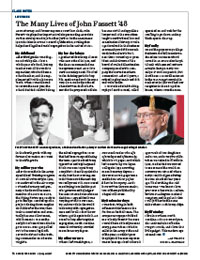Class Notes
 FACETS OF FASSETT: An undergraduate, a husband and father, a lawyer and law clerk and recognized legal scholar. (Photo: University Libraries/Department of Rare Books, Special Collections, and Preservation (left); Courtesy of John Fassett ’48 (others))
FACETS OF FASSETT: An undergraduate, a husband and father, a lawyer and law clerk and recognized legal scholar. (Photo: University Libraries/Department of Rare Books, Special Collections, and Preservation (left); Courtesy of John Fassett ’48 (others))As an attorney and former Supreme Court law clerk, John Fassett ’48 played an important role in persuading Associate Justice Stanley Reed to join other justices in the unanimous 1954 decision in Brown v. Board of Education, a ruling that helped end legalized racial segregation in the United States.
My childhood
After third grade I was diagnosed with polio. I lost a whole year of school, but my teacher sent all the work to my mother, who had been a schoolteacher, and she supplemented it with a lot more work. When I was allowed to return the next year, the school decided I didn’t belong in the fourth grade with my former classmates. So I went to the fifth grade.
My military service
After six months in the Army Specialized Training Program at Cornell University in 1943, I transferred to the Air Corps. I attended armory and gunnery schools and became a member of a crew on B-17s, the Flying Fortresses, ready to go to Europe. I ended up on a project closing down surplus air fields after the war, then took a commission and eventually became a lieutenant, which meant I was on the early list of reservists called to go to Korea. But I got pulled out to become a legal officer and assistant to the training commander on a base in Virginia.
My law clerk days
I graduated first in my class at Yale Law School in 1953, and the dean recommended me to Supreme Court Associate Justice Stanley Reed. That led to the defining period of my life. Justice Reed and I became very close. He had produced a handwritten draft of a dissent that he proposed to file in the school segregation cases that had been reargued during the term. I put the draft in my typewriter and triple-spaced it to have room to put in my complaints about the points he made, how he was wrong. He took it home and the next day we really went at it. He accused me of trying to make him part of a “government by judges” because I wanted a unanimous decision. I argued that it was very important to our country and our role in the world to do away with segregation once and for all. I don’t know where I got the guts to do it. As a result of my efforts against segregation, North Carolina Central University awarded me an honorary degree.
My other careers
When I left Washington, I became a trial and appellate lawyer and at the same time taught constitutional law and constitutional history at Yale. I got involved in the business community and did so much work in the electric business that I wound up as president and chairman of the board of United Illumination Company, an electric company that served southern Connecticut. After 11 years, I retired to play tennis and fish and write books.
I wrote the definitive biography of Justice Reed, called New Deal Justice: The Life of Stanley Reed of Kentucky, which is 771 pages, and which led to Kentucky Wesleyan College in 1999 awarding me an honorary degree. I also wrote a 764-page tome entitled UI: History of an Electrical Company. And I have written three memoirs, two of them published by Chapel Hill Press.
My Rochester days
I was first-string in both offense and defense on the freshman football team. The campus newspaper dubbed me “Bloody Fassett” because I would have a bloody nose at every game. When I tried to enlist in the Army at the end of the year, I couldn’t pass the physical because my nose was so beat up. I had to have it operated on and wait for the swelling to go down and my black eyes to clear up.
My family
One of the guys on my college freshman football team introduced me to a nurse who’d served in an evacuation hospital unit with General Patton’s Army in Europe. Betty was only 5’ 2” and 100 pounds, but she’d been a second lieutenant in the war. We got married in Rochester in 1947 and had our reception in the Psi Upsilon house, where I was the manager. We had two daughters and a son, and a very busy life. When we retired to Florida in 1985, we decided we wanted to see some of the world. In Germany we retraced where Betty’s unit had gone during the war. She died four years ago. The last thing she said to me was, “You know I love you.” Her ashes are in a columbarium at Arlington National Cemetery, and the plan is that I will join her in the same niche when I cash in my chips.
My life today
I live in Durham, North Carolina. I do crossword puzzles and read a lot of books. I’ve got a Nook, and I love that little gadget. This modern age astounds me.
—As told to Robin L. Flanigan

